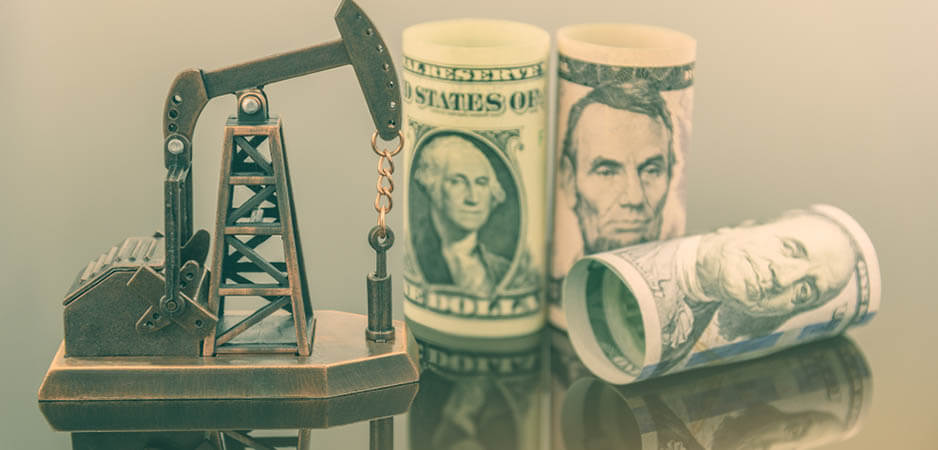For those who don’t understand why it’s essential to have money before you can make money, the case of Saudi Aramco demonstrates the underlying logic of the free-market system.
For more than a year, Riyadh has been toying with the idea of going public with its wholly-owned petroleum company, Saudi Aramco, now declared the most profitable firm on the planet, with a net income for 2018 of $111.1 billion. Business Insider reveals that “Aramco is issuing a $10 billion bond to investors after doubling its profits in 2018 on the back of improved oil prices.” We also learn the motive behind the appeal: “One of the main advantages of issuing the bond is to gain high ratings from the various credit agencies. (Aramco doesn’t need the money, after all.)”
Here is today’s 3D definition:
Credit ratings:
They key to obtaining more money from people who have too much money, enabling those who don’t need the money to increase their holdings and power by proving as unequivocally as possible that they don’t need the money they are asking others to invest in them
Contextual note
This story provides a good illustration of how utterly unrealistic Karl Marx’s vision of future society turns out to be. Whereas Marx envisaged a society based on the principle, “From each according to his ability to each according to his needs,” today’s economic reality teaches us that the true law of the marketplace is: From each according to his excess capacity to each according to his lack of need — which essentially describes a neat, self-sustaining closed-circuit process.
This is the ultimate win-win strategy, or rather “win-bigger-after-having-already-won” strategy. The company, such as Aramco, that has already won by achieving a stable position in its marketplace — which means it doesn’t need money but can always use it profitably — is by definition perfectly placed to get more money, enabling it to augment its ability to control its marketplace, stifle competitors, lobby governments for favorable laws, suborn politicians, go more vertical or more horizontal, as required, or achieve any other of its expanding goals.
Those who actually need money will, of course, have to wait until they build the credibility of their credit rating to have access to it. (This opens another chapter — which we will not develop here — on how venture capitalists, whose only interest is in making a quick profit by selling out at the right moment, provide another way of throttling or hijacking true innovation and authentic responses to human needs.)
The investors who, thanks to an excess of resources, have money to spare because they don’t need it for their own subsistence or comfort (having already won their previous bets) can exploit the opportunity — with no additional effort on their part — to increase their holdings. They do this by purchasing bonds or shares in firms with the unimpeded power to get more money, even if that money doesn’t come directly from either their activity of production and sales or their productivity.
The rating agency Moody’s considers Aramco “more profitable than Apple, Amazon, and Alphabet (Google’s parent company) combined.” Business Insider calls this move “part of a transparency push on behalf of Saudi Arabia,” whose reputation for transparency was recently tarnished by the assassination of Saudi journalist Jamal Khashoggi. Apparently the Saudis are more prone to be transparent about money than about people’s lives or their right of expression.
Historical note
The article informs us that “Saudi Arabia’s state-owned oil giant blows the rest of the world out of the water with its gargantuan profits.” If the company is identical to the nation and the nation is an absolute monarchy, are we talking about capitalism or just using the terms of capitalism to describe something else?
This is clearly beyond communism, where the state controls the means of production, because in communism, at least theoretically, the state is supposed to represent the people, not a tribal clan. What the Western financial media sees as the bright side of this picture is the fact that “Saudi Arabia is attempting to diversify its oil-heavy economy and attract new capital to the kingdom.”
According to The New York Times, Aramco wants the money to “help finance its purchase of most of a state-owned petrochemical company from Saudi Arabia’s sovereign wealth fund, whose chairman is Crown Prince Mohammed bin Salman.” Thanks to what the Turks, the CIA and many others have called his ordering of Khashoggi’s assassination in Istanbul, the man known as MBS — who also happens to be Jared Kushner’s best friend and most intimate associate in the Middle East — has become a household name.
Investors always want to be informed about risk factors. Though they don’t “need” the money they are ready to invest, they don’t want to lose it and, therefore, must evaluate the difference between their expectation of gain and the risk of loss. Aramco is solid but potentially vulnerable. “Unlike Exxon and Chevron, its revenue streams are highly dependent on a single country that could face real instability risks,” says analyst Ayham Kamel.
In other words, some are saying to themselves: Damn! That unpredictable and uncontrollable MBS, who hasn’t mastered the etiquette of licit political and financial skullduggery, might just make this a toxic investment.
Luckily, the analysts at Moody’s agree that “Aramco has ‘a huge amount of room’ to issue debt.” They added this thought: “Aramco’s scale of production in combination with its vast hydrocarbon resources is a very strong competitive advantage.”
In the world of global free-market capitalism, it’s always good to hear that a state monopoly that may be offering rich investors the possibility to acquire a stake in it benefits from “a very strong competitive advantage.” There’s a world of opportunity out there for the enterprising. All they need to do is follow Aramco’s example and boost their credit rating .
*[In the age of Oscar Wilde and Mark Twain, another American wit, the journalist Ambrose Bierce, produced a series of satirical definitions of commonly used terms, throwing light on their hidden meanings in real discourse. Bierce eventually collected and published them as a book, The Devil’s Dictionary, in 1911. We have shamelessly appropriated his title in the interest of continuing his wholesome pedagogical effort to enlighten generations of readers of the news.]
The views expressed in this article are the author’s own and do not necessarily reflect Fair Observer’s editorial policy.
Support Fair Observer
We rely on your support for our independence, diversity and quality.
For more than 10 years, Fair Observer has been free, fair and independent. No billionaire owns us, no advertisers control us. We are a reader-supported nonprofit. Unlike many other publications, we keep our content free for readers regardless of where they live or whether they can afford to pay. We have no paywalls and no ads.
In the post-truth era of fake news, echo chambers and filter bubbles, we publish a plurality of perspectives from around the world. Anyone can publish with us, but everyone goes through a rigorous editorial process. So, you get fact-checked, well-reasoned content instead of noise.
We publish 2,500+ voices from 90+ countries. We also conduct education and training programs
on subjects ranging from digital media and journalism to writing and critical thinking. This
doesn’t come cheap. Servers, editors, trainers and web developers cost
money.
Please consider supporting us on a regular basis as a recurring donor or a
sustaining member.
Will you support FO’s journalism?
We rely on your support for our independence, diversity and quality.






